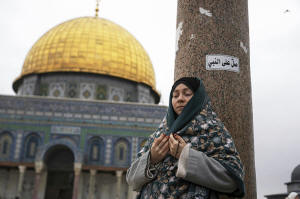90,000 Palestinians attend the first Friday prayers of Ramadan in
Jerusalem
[March 08, 2025]
By IMAD ISSEID and JULIA FRANKEL
JERUSALEM (AP) — In the first Friday prayers of the Muslim holy month of
Ramadan, about 90,000 Palestinians prayed at the Al-Aqsa Mosque compound
in Jerusalem’s Old City under tight security by Israeli forces.
Thousands made their way from the West Bank into Jerusalem after Israel
allowed men over 55 and women over 50 to enter from the occupied
territory for the prayers. Tensions have risen in the West Bank in the
past weeks amid Israeli raids on militants. There was no immediate sign
of frictions in Jerusalem on Friday.
However, Palestinian authorities said Israeli soldiers had stormed eight
mosques around the city of Nablus, in the north of the Israeli-occupied
West Bank.
In a statement posted to X, the Palestinian Ministry of Foreign Affairs
said Israeli operations set fire to “large sections” of the Al-Nasr
mosque in the old city of Nablus, posting a photo of the interior of the
mosque, where walls appeared blackened. The mosque used to be a
Byzantine church.
Asked for comment, the military said it was “not aware” of any fire set
by soldiers at the site.
A chance to enter a holy place
For many Palestinians, Friday marked their first opportunity to enter
Jerusalem since last Ramadan about a year ago, when Israel also let in
worshippers under similar restrictions.
Since the outbreak of the Israel-Hamas war in October 2023, the Israeli
government blocked Palestinians in the West Bank from crossing to
Jerusalem or visiting Israel. Cuts to USAID by the Trump administration
have also set back aid groups operating in Gaza.
Last Ramadan, the war was raging, but this time, a fragile ceasefire is
in place since mid-January — though its future is uncertain. Since
Sunday, Israel has barred all food, fuel, medicine and other supplies
from entering Gaza for some 2 million people, demanding Hamas accept a
revised deal.

Prayers at the Dome of the Rock and in the rubble of Gaza
In Gaza, thousands gathered for the Friday communal prayers in the
shattered concrete husk of Gaza City's Imam Shafi’i Mosque, heavily
damaged by Israeli forces during fighting. During Ramadan, Muslims fast
from dawn until sunset as a sign of humility, submission to God and
sympathy for the poor and hungry.
On Thursday evening, Palestinians strung festive Ramadan lights around
the rubble of destroyed buildings surrounding their tent camp in Gaza
City and set up long communal tables for hundreds of people where aid
groups served up iftar, the meal that breaks the daily fast.
At Al-Aqsa Mosque in Jerusalem, Nafez Abu Saker said he left his home in
the village of Aqraba in the northern West Bank at 7 a.m., taking three
hours to make the 45-kilometer (20-mile) trip through Israeli
checkpoints to reach Jerusalem. “If the people from the West Bank will
be permitted to come, people from all the cities, villages and camps
will come to Al-Aqsa to pray," he said.
“The reward of prayer here is like 500 prayers — despite the difficulty
of the road to get here. It brings a great reward from God,” said Ezat
Abu Laqia, also from Aqraba.
The faithful formed rows to listen to the Friday sermon and kneel in
prayer at the foot of the golden Dome of the Rock on the sprawling
mosque compound. The Islamic Trust, which oversees the Al-Aqsa compound,
said 90,000 attended the prayers. The Israeli police said it deployed
thousands of additional officers around the area.
The compound, revered by Jews as the Temple Mount, and the surrounding
area of Jerusalem’s Old City have been the site of clashes between
Palestinians and Israeli police in the past. The Old City is part of
east Jerusalem, captured by Israel along with the West Bank and Gaza
Strip in the 1967 Mideast War. Israel has since annexed the sector,
though Palestinians seek it and the territories for an independent
state.

[to top of second column]
|

A woman prays at the Al-Aqsa Mosque compound during the first Friday
Prayers of the Muslim holy month of Ramadan in the Old City of
Jerusalem, Friday, March 7, 2025. Arabic on top right reads: "Pray
for the Prophet." (AP Photo/Mahmoud Illean)

Tight security and delays at checkpoints
Thousands of Palestinians coming from the West Bank lined up at the
Qalandia checkpoint on the edge of Jerusalem to attend the prayers.
But some were turned away, either because they didn’t have the
proper permits or because the checkpoint closed.
Israeli police said authorities had approved the entry of 10,000
Palestinians from the West Bank, but did not say how many made it
into Jerusalem.
“All the young people, elderly people and women were waiting here.
They refused to let anyone cross at the checkpoint,” said Mohammed
Owaisat, who arrived to find the crossing closed.
The fragile ceasefire
The first phase of the Israel-Hamas ceasefire brought the release of
25 Israeli hostages held by militants in Gaza and the bodies of
eight others in exchange for the freeing of nearly 2,000
Palestinians imprisoned by Israel.
But an intended second phase of the deal — meant to bring the
release of remaining hostages and a lasting truce and full Israeli
withdrawal from Gaza — has been thrown into doubt. Israel has balked
at entering negotiations over the terms of the second phase.
Instead, it has called for Hamas to release half its remaining
hostages in return for an extension of the ceasefire and a promise
to negotiate a lasting truce.
It says its bar on aid to Gaza will continue and could be escalated
until Hamas accepts the proposal — a move rights groups and Arab
countries have decried as a “starvation tactic.” Hamas has demanded
implementation of the original ceasefire deal.
A Hamas delegation arrived in Cairo on Friday to discuss the
implementation of the deal and to push for the second phase, Egypt’s
State Information Service said.
Israel’s military offensive has killed over 48,000 Palestinians in
Gaza, mostly women and children, according to Gaza’s Health
Ministry, which does not say how many of the dead were militants.
The campaign was triggered by Hamas’ Oct. 23, 2023 attack on
southern Israel, in which militants killed some 1,200 people, mostly
civilians, and took a total of 251 people hostage. Most have been
released in ceasefire agreements or other arrangements. Hamas is
believed to still have 24 living hostages and the bodies of 34
others.

Hamas on Friday released video footage of Israeli hostage Matan
Angrest in captivity and claimed that remaining hostages feel the
Israeli government has abandoned them and also called on Trump to
bring them home.
In the video, Angrest, an Israeli soldier taken captive from the
Nahal Oz military base, says there’s no sunlight and that winter
conditions are tough in Gaza.
Likely speaking under duress, he appealed to Donald Trump, saying
the U.S. president is the only one who can return all the hostages
because of his influence over Benjamin Netanyahu's government.
Angrest's family said it was “shaken by the video” and added that
his appearance in the footage makes them fear that he has been
tortured.
All contents © copyright 2025 Associated Press. All rights reserved |